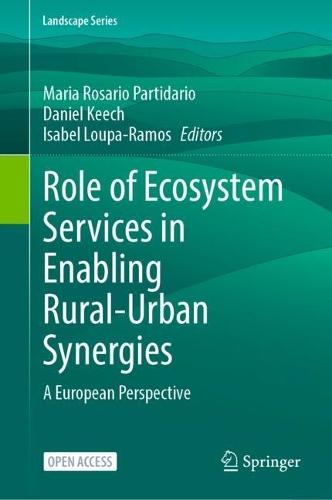Overview
This open access book elaborates on the role Ecosystem Services play in relation to establishing, and enhancing, rural-urban synergies. It draws on the concept of Ecosystem Services (ESS) as the ecological characteristics, functions, or processes that directly or indirectly contribute to human wellbeing, that is, the benefits that people derive from functioning ecosystems. The empirical and theoretical research that supports the various contributions in this book was developed in the context of the project H2020 ROBUST - Rural-Urban Outlooks: Unlocking Synergies (GA: 727988). The project was structured in five Communities of Practice (CoP), as groups of researchers sharing a common thematic interest. One of these CoP was dedicated to ESS and aimed to investigate its role in unlocking synergies across rural and urban territories. Strategic approaches to integrate ESS in spatial planning were developed associating ESS use and delivery to planning instruments and governance models at multiple scales. The approach assumes the engagement of multiple actors both as users of ESS but also in their position as planners, regulators, land owners or other type of decision-making role, to explore the role of ESS in enhancing rural-urban synergies. The purpose has been to ensure the balance between supply and demand of ESS, seeking instruments, and the governance models for public policy, market and science and technology, that will encourage alternative practices and policy integrated goals, thus enabling resilience and social well-being. Ultimately the purpose has been to generate transition processes towards the recognition of socio-ecological systems inclusive of new ESS based societal values leading rural-urban synergies. In other words, such inclusive of socio-ecological systems are seen as a condition for human well-being. Theoretical investigation in five core themes and its implementation in six different living laboratories form the more substantive content of this book. In addition, ESS is analysed in the context of its integration with other relevant themes in a cross-sectoral perspective. Overall the purpose of the book is to communicate the multiple and constructive roles played by ESS in rural-urban synergies, using multiple lenses, looking particularly into challenges and merits, and into different imaginative forms of making such as abstract concept more concrete, operational and recognized by stakeholders in the field.
Full Product Details
Author: Maria Rosario Partidario ,
Daniel Keech ,
Isabel Loupa-Ramos
Publisher: Springer International Publishing AG
Imprint: Springer International Publishing AG
Volume: 20
ISBN: 9783031981524
ISBN 10: 3031981529
Pages: 301
Publication Date: 02 October 2025
Audience:
Professional and scholarly
,
Professional & Vocational
Format: Hardback
Publisher's Status: Active
Availability: Not yet available

This item is yet to be released. You can pre-order this item and we will dispatch it to you upon its release.
Author Information
The three editors are academics, long-term researchers is the fields of ecosystem services, rural development, participatory planning and strategic assessment. Maria Partidario and Isabel Loupa Ramos are with CiTUA, the research Centre on Innovation, Territory, Transports, Urbanism, Architecture and Environment, of Tecnico - ULisboa, Portugal, and Daniel Keech is with the Countryside & Community Research Institute, University of Gloucestershire, in the UK. They were active members of the ROBUST team. Maria Partidario was coordinator of the CoP on Ecosystem Services, closely supported by Isabel Loupa Ramos and Daniel Keech. Isabel Loupa Ramos was also involved with the CoP on Sustainable Food Systems, along with Daniel Keech. Daniel Keech was one of the co-coordinators of the Living Labs approach within ROBUST, co-responsible for developing guidance for the methodology followed by all Living Labs. This book is the outcome of a strong and close relationship between the three, but of course benefitting from the engagement of all book chapter co-authors, all members of the ROBUST project’s team.



